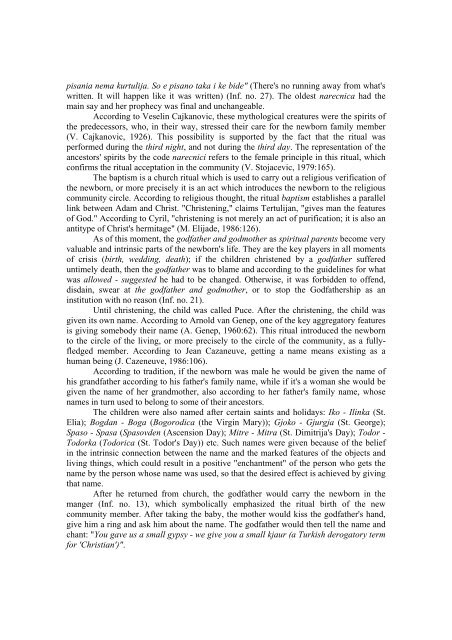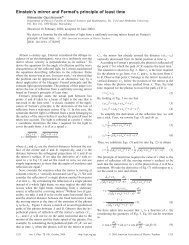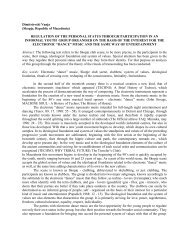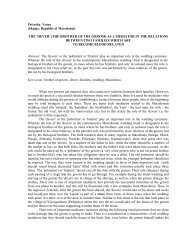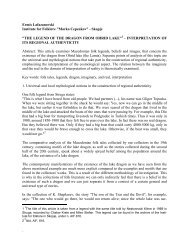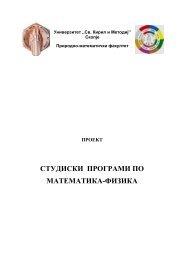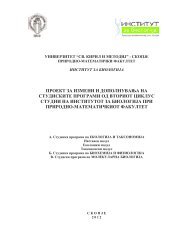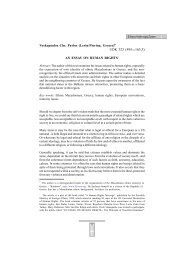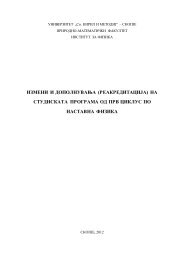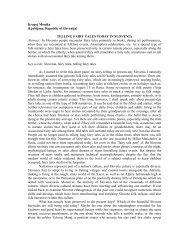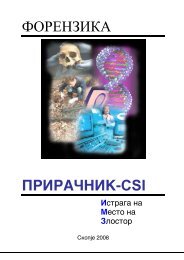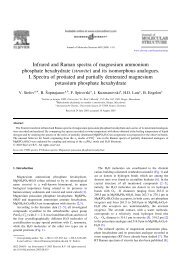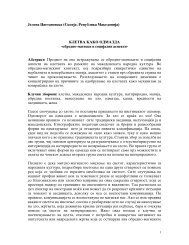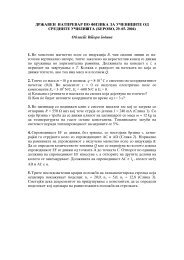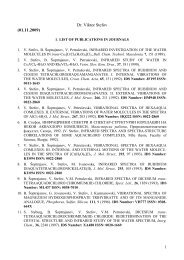Ljupco Nedelkov (Skopje, Macedonia) THE BIRTH RITUAL OF ...
Ljupco Nedelkov (Skopje, Macedonia) THE BIRTH RITUAL OF ...
Ljupco Nedelkov (Skopje, Macedonia) THE BIRTH RITUAL OF ...
You also want an ePaper? Increase the reach of your titles
YUMPU automatically turns print PDFs into web optimized ePapers that Google loves.
pisania nema kurtulija. So e pisano taka i ke bide" (There's no running away from what's<br />
written. It will happen like it was written) (Inf. no. 27). The oldest narecnica had the<br />
main say and her prophecy was final and unchangeable.<br />
According to Veselin Cajkanovic, these mythological creatures were the spirits of<br />
the predecessors, who, in their way, stressed their care for the newborn family member<br />
(V. Cajkanovic, 1926). This possibility is supported by the fact that the ritual was<br />
performed during the third night, and not during the third day. The representation of the<br />
ancestors' spirits by the code narecnici refers to the female principle in this ritual, which<br />
confirms the ritual acceptation in the community (V. Stojacevic, 1979:165).<br />
The baptism is a church ritual which is used to carry out a religious verification of<br />
the newborn, or more precisely it is an act which introduces the newborn to the religious<br />
community circle. According to religious thought, the ritual baptism establishes a parallel<br />
link between Adam and Christ. "Christening," claims Tertulijan, "gives man the features<br />
of God." According to Cyril, "christening is not merely an act of purification; it is also an<br />
antitype of Christ's hermitage" (M. Elijade, 1986:126).<br />
As of this moment, the godfather and godmother as spiritual parents become very<br />
valuable and intrinsic parts of the newborn's life. They are the key players in all moments<br />
of crisis (birth, wedding, death); if the children christened by a godfather suffered<br />
untimely death, then the godfather was to blame and according to the guidelines for what<br />
was allowed - suggested he had to be changed. Otherwise, it was forbidden to offend,<br />
disdain, swear at the godfather and godmother, or to stop the Godfathership as an<br />
institution with no reason (Inf. no. 21).<br />
Until christening, the child was called Puce. After the christening, the child was<br />
given its own name. According to Arnold van Genep, one of the key aggregatory features<br />
is giving somebody their name (A. Genep, 1960:62). This ritual introduced the newborn<br />
to the circle of the living, or more precisely to the circle of the community, as a fullyfledged<br />
member. According to Jean Cazaneuve, getting a name means existing as a<br />
human being (J. Cazeneuve, 1986:106).<br />
According to tradition, if the newborn was male he would be given the name of<br />
his grandfather according to his father's family name, while if it's a woman she would be<br />
given the name of her grandmother, also according to her father's family name, whose<br />
names in turn used to belong to some of their ancestors.<br />
The children were also named after certain saints and holidays: Iko - Ilinka (St.<br />
Elia); Bogdan - Boga (Bogorodica (the Virgin Mary)); Gjoko - Gjurgja (St. George);<br />
Spaso - Spasa (Spasovden (Ascension Day); Mitre - Mitra (St. Dimitrija's Day); Todor -<br />
Todorka (Todorica (St. Todor's Day)) etc. Such names were given because of the belief<br />
in the intrinsic connection between the name and the marked features of the objects and<br />
living things, which could result in a positive "enchantment" of the person who gets the<br />
name by the person whose name was used, so that the desired effect is achieved by giving<br />
that name.<br />
After he returned from church, the godfather would carry the newborn in the<br />
manger (Inf. no. 13), which symbolically emphasized the ritual birth of the new<br />
community member. After taking the baby, the mother would kiss the godfather's hand,<br />
give him a ring and ask him about the name. The godfather would then tell the name and<br />
chant: "You gave us a small gypsy - we give you a small kjaur (a Turkish derogatory term<br />
for 'Christian')".


